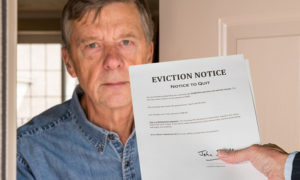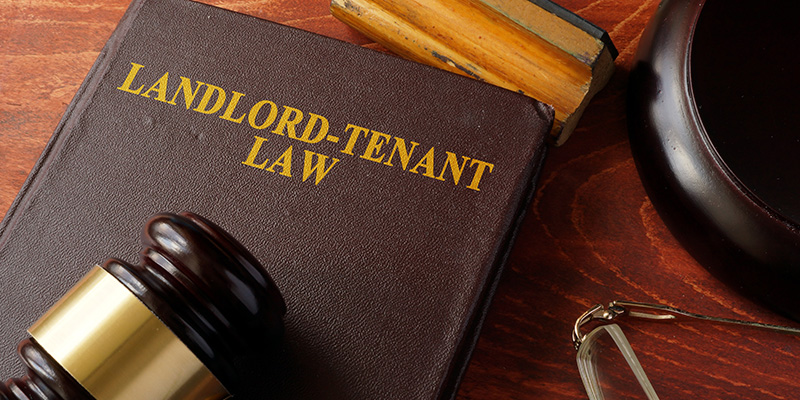Illegal eviction is a real problem in the United States, and many tenants don’t even know they have fallen victim to it. You must know how to identify when a landlord is evicting you unlawfully and what recourse you have available.
In this article:
What Is the Meaning of Illegal Eviction?
When a landlord wants to evict a tenant, they must go through a legal procedure as outlined by state laws. The specifics of this procedure can vary from state to state, though it generally involves the following steps:
- Send a termination notice to the tenant (Pay or Quit Notice, Cure or Quit Notice, or Unconditional Quit Notice)
- File an eviction lawsuit if the tenant fails or refuses to remedy the situation (Pay or Cure)
- Allow the tenant time to respond to the complaint and summons
- Obtain a judgment for possession
- Remove the tenant with the help of law enforcement
The process can take a lot of time and the court costs can definitely add up. Because of this, a lot of landlords willfully choose to forgo the eviction process, taking the matter into their own hands. When landlords fail to follow the legal guidelines for evicting a tenant, it is considered an illegal eviction.
Types of Unlawful Eviction
 Illegal eviction can also extend to the grounds the landlord cites to evict a tenant. A landlord may follow the eviction process to the letter but have unlawful reasons for forcing a tenant out.
Illegal eviction can also extend to the grounds the landlord cites to evict a tenant. A landlord may follow the eviction process to the letter but have unlawful reasons for forcing a tenant out.
This can include discriminatory eviction, retaliatory eviction, eviction due to nonpayment of rent until a health or safety issue is remedied, and eviction of a protected tenant.
Discriminatory Eviction
The Fair Housing Act offers protection to certain classes of people, namely race, color, religion, national origin, sex, disability, and/or familial status. When a landlord evicts a tenant because they are a member of a certain class, that is called discriminatory eviction. And, evicting a tenant as a result of discrimination is illegal.
Keep in mind that your state may also have its own Fair Housing laws. In California, for instance, protected classes also cover gender identity or expression, medical condition, age, and more.
Retaliatory Eviction
Landlords and tenants sometimes have a contentious relationship. Conflicts can arise and arguments can turn heated. But, a landlord can’t evict you in retaliation for something you did.
For example, if you complained about an issue with the unit, your landlord can’t force you out just because they are mad that you brought it up. Retaliatory eviction also usually happens when tenants legally report their landlords to the housing authority or health department.
Eviction Due to Nonpayment of Rent Until Health or Safety Issue Is Remedied
Nonpayment of rent is a common cause for lawful eviction because it violates the lease agreement. But, if a tenant is withholding rent because the landlord refuses to address a health or safety issue, then the landlord can’t legally evict them for that reason. It is important to know your tenant rights eviction process.
Protected Tenant Eviction
In some states or counties, some tenants are considered protected tenants. Examples include tenants who are above a certain age or tenants who have resided at a unit for a set number of years. Landlords will have a hard time evicting protected tenants, and it may even constitute an illegal eviction even if the landlord has a good reason to remove them.
Self-Help and Landlord Harassment
Landlords will sometimes use self-help methods to evict a tenant and re-assume possession of the property. These methods, though, are illegal and can even represent landlord harassment. A majority of states do not allow landlords to use self-help for tenant evictions.
Illegal landlord actions that constitute self-help include but are not limited to:
- Changing the locks
- Shutting off utilities
- Removing the unit’s front door
- Removing the tenant’s belongings from the unit
- Harassing, intimidating, or threatening the tenant in any way
What to Do If You Are Wrongfully Evicted
Can I sue for wrongful eviction? This is a question that many tenants ask when they feel their landlord has removed them illegally from the property. The short answer is yes. If you have been wrongfully evicted and served with an illegal eviction notice, you can sue your landlord.
If your landlord turned to self-help methods, some of the things you can sue your landlord for include but are not limited to:
- Wrongful eviction
- Trespassing
- Assault
- Battery
- Libel
- Slander
- Intentional infliction of emotional distress
Keep in mind, though, that you will need to prove your case in a court of law. That means you need to have evidence of wrongdoing on your landlord’s part. It is best to hire a wrongful eviction lawyer to help you out.
Additionally, if you have been illegally evicted, you must take action as soon as you can. The wrongful eviction statute of limitations can vary from state to state, but tenants generally have about a year to file a lawsuit. In some cases, it is even less than that.
It is also worth noting that your landlord cannot use your bad behavior, lease violations, or nonpayment of rent as their defenses to the case. If your landlord evicted you in a wrongful manner, then according to unlawful eviction law, you do have grounds to file a lawsuit against them.
Damages for Illegal Eviction
 As a tenant, you are entitled to actual money damages as illegal eviction compensation.
As a tenant, you are entitled to actual money damages as illegal eviction compensation.
A court may order your landlord to provide reparations for a variety of things such as any food that spoiled as a result of your electricity being turned off or any belongings you lost because your landlord removed your front door. Your landlord may even need to provide you with compensation for temporary housing. Collectively, these are known as economic damages.
You may also receive compensation for non-economic damages as well as punitive damages. Non-economic damages refer to compensation for the pain, suffering, or emotional distress you went through. Punitive damages, on the other hand, are monetary amounts designed to penalize your landlord. This can be as much as two to three times larger than your economic damages, though it depends on where you live.
How Much Can I Sue for Wrongful Eviction?
Illegal eviction penalties can vary from state to state. In California, for instance, you can sue for actual damages in addition to $100 per day of violation with a $250 minimum. The state statute also provides for your attorney’s fees, court costs, and gives you the right to stay.
In contrast, Colorado allows you to sue for any damages. But, unlike California, the Colorado statute does not provide for your attorney’s fees and court costs. Plus, the statute does not give you the right to stay.
In Florida, you can sue for actual damages or three months’ worth of rent, whichever is higher. The Florida statute also provides for your attorney’s fees and court costs. But, like Colorado, the statute does not give you the right to stay.
The extent of the damages for unlawful eviction can change from one state to another. Thus, it is imperative that you check your own state laws to see how much you can sue your landlord for.
FAQs
Can a landlord evict you for no reason?
It depends on whether you have a month-to-month rental agreement or a fixed-term lease. If you have a month-to-month agreement, then your landlord can generally evict you without reason. But, in some cities and states like California, New York, and New Jersey, landlords need just cause to evict a tenant. Compared to evictions with just cause, evictions without just cause usually require a longer notice period. Of course, your landlord still can’t evict you in retaliation, as a result of discrimination, or through illegal means.
If you have a fixed-term lease, then your landlord must have just cause to evict you mid-lease. Normally, this happens when you violate the terms of your lease such as failing to pay rent or allowing another occupant to stay as your roommate without permission. Landlords can also evict you mid-lease if you participate in any illicit acts on the property.
Can I call the police to evict a tenant?
Landlords can’t ask law enforcement to evict a tenant for them. They must still go through the eviction process. Once a court rules in favor of the landlord, the tenant receives time to vacate the premises. If the tenant refuses or fails to do so by the deadline, the landlord can then ask a law enforcement officer to help them remove the tenant from the property.
Can a landlord remove my belongings?
A landlord cannot use self-help methods to evict a tenant. This includes removing your personal belongings from the property in an effort to get you to move out. Most states prohibit self-help, and a landlord that uses such methods may face punishment.
Can a judge stop an eviction?
If the eviction is in any way unlawful, you may file a lawsuit against your landlord. Once a judge rules in your favor, they may serve an illegal eviction injunction and order your landlord to provide compensation. Some state statutes even give tenants the right to stay.
Knowledge Is Power
Both landlords and tenants must know what constitutes an illegal eviction. That way, landlords can avoid it and tenants can learn to recognize it. Given the consequences of illegal eviction, landlords must do their best to act within the law. Tenants, on the other hand, now know that they have the ability to sue when faced with such a situation.
Managing tenants is a tough job, and many landlords are not cut out for it. This is where a property management company can help. Find the best one in your area today using our comprehensive online directory.
RELATED ARTICLES:
- When Is It Right To Evict A Tenant?
- Is Renting Or Selling Your Home During The Holidays A Good Idea?
- Are You Charging A Fair Rental Rate?




 Company
Company